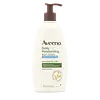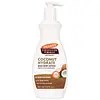What's inside
What's inside
 Key Ingredients
Key Ingredients

 Benefits
Benefits

 Concerns
Concerns

 Ingredients Side-by-side
Ingredients Side-by-side

Water
Skin ConditioningDicaprylyl Ether
EmollientGlycerin
HumectantCaprylic/Capric Triglyceride
MaskingStearic Acid
CleansingAvena Sativa Kernel Flour
AbrasiveCetyl Alcohol
EmollientCetearyl Alcohol
EmollientPhenoxyethanol
PreservativeDimethicone
EmollientCaprylyl Glycol
EmollientCarbomer
Emulsion StabilisingCeteareth-20
CleansingSodium Hydroxide
BufferingChlorphenesin
AntimicrobialSodium Citrate
BufferingCitric Acid
BufferingWater
Skin ConditioningCocos Nucifera Fruit Extract
EmollientGlycine Soja Oil
EmollientButyrospermum Parkii Butter
Skin ConditioningIsopropyl Myristate
EmollientPropylene Glycol
HumectantCetyl Alcohol
EmollientPalmitic Acid
EmollientStearic Acid
CleansingCocos Nucifera Oil
MaskingTheobroma Cacao Seed Butter
EmollientTocopherol
AntioxidantTocopheryl Acetate
AntioxidantGardenia Taitensis Flower Extract
Skin ConditioningPrunus Amygdalus Dulcis Oil
Skin ConditioningMacadamia Ternifolia Seed Oil
EmollientAloe Barbadensis Leaf Juice
Skin ConditioningNonfat Dry Milk
Skin ConditioningCitric Acid
BufferingPotassium Sorbate
PreservativeSodium Benzoate
MaskingTriethanolamine
BufferingEthylhexylglycerin
Skin ConditioningCarbomer
Emulsion StabilisingGlycerin
HumectantPEG-40 Stearate
EmulsifyingTetrasodium EDTA
Pentylene Glycol
Skin ConditioningDecylene Glycol
Skin Conditioning1,2-Hexanediol
Skin ConditioningStearyl Alcohol
EmollientPhenoxyethanol
PreservativeParfum
MaskingBenzyl Alcohol
PerfumingBenzyl Benzoate
AntimicrobialCoumarin
PerfumingWater, Cocos Nucifera Fruit Extract, Glycine Soja Oil, Butyrospermum Parkii Butter, Isopropyl Myristate, Propylene Glycol, Cetyl Alcohol, Palmitic Acid, Stearic Acid, Cocos Nucifera Oil, Theobroma Cacao Seed Butter, Tocopherol, Tocopheryl Acetate, Gardenia Taitensis Flower Extract, Prunus Amygdalus Dulcis Oil, Macadamia Ternifolia Seed Oil, Aloe Barbadensis Leaf Juice, Nonfat Dry Milk, Citric Acid, Potassium Sorbate, Sodium Benzoate, Triethanolamine, Ethylhexylglycerin, Carbomer, Glycerin, PEG-40 Stearate, Tetrasodium EDTA, Pentylene Glycol, Decylene Glycol, 1,2-Hexanediol, Stearyl Alcohol, Phenoxyethanol, Parfum, Benzyl Alcohol, Benzyl Benzoate, Coumarin
Ingredients Explained
These ingredients are found in both products.
Ingredients higher up in an ingredient list are typically present in a larger amount.
Carbomer is a polymer of acrylic acid. Its main role is to create a gel consistency.
A high amount of carbomer can cause pilling or balling up of products. Don't worry, most products contain 1% or less of carbomer.
Cetyl Alcohol is a fatty alcohol. Fatty Alcohols are most often used as an emollient or to thicken a product.
Its main roles are:
Though it has "alcohol" in the name, it is not related to denatured alcohol or ethyl alcohol.
The FDA allows products labeled "alcohol-free" to have fatty alcohols.
Learn more about Cetyl AlcoholCitric Acid is an alpha hydroxy acid (AHA) naturally found in citrus fruits like oranges, lemons, and limes.
Like other AHAs, citric acid can exfoliate skin by breaking down the bonds that hold dead skin cells together. This helps reveal smoother and brighter skin underneath.
However, this exfoliating effect only happens at high concentrations (20%) which can be hard to find in cosmetic products.
Due to this, citric acid is usually included in small amounts as a pH adjuster. This helps keep products slightly more acidic and compatible with skin's natural pH.
In skincare formulas, citric acid can:
While it can provide some skin benefits, research shows lactic acid and glycolic acid are generally more effective and less irritating exfoliants.
Most citric acid used in skincare today is made by fermenting sugars (usually from molasses). This synthetic version is identical to the natural citrus form but easier to stabilize and use in formulations.
Read more about some other popular AHA's here:
Learn more about Citric AcidGlycerin is already naturally found in your skin. It helps moisturize and protect your skin.
A study from 2016 found glycerin to be more effective as a humectant than AHAs and hyaluronic acid.
As a humectant, it helps the skin stay hydrated by pulling moisture to your skin. The low molecular weight of glycerin allows it to pull moisture into the deeper layers of your skin.
Hydrated skin improves your skin barrier; Your skin barrier helps protect against irritants and bacteria.
Glycerin has also been found to have antimicrobial and antiviral properties. Due to these properties, glycerin is often used in wound and burn treatments.
In cosmetics, glycerin is usually derived from plants such as soybean or palm. However, it can also be sourced from animals, such as tallow or animal fat.
This ingredient is organic, colorless, odorless, and non-toxic.
Glycerin is the name for this ingredient in American English. British English uses Glycerol/Glycerine.
Learn more about GlycerinPhenoxyethanol is a preservative that has germicide, antimicrobial, and aromatic properties. Studies show that phenoxyethanol can prevent microbial growth. By itself, it has a scent that is similar to that of a rose.
It's often used in formulations along with Caprylyl Glycol to preserve the shelf life of products.
Stearic Acid is a fatty acid. It is an emollient, emulsifier, and texture enhancer.
As an emollient, stearic acid helps soften skin. It aids the skin's protective barrier by preventing water loss. It also provides a gentle cleansing effect without stripping away natural oils.
Stearic acid may also be used to enhance the texture of products. It can add volume and stabilize ingredients such as water and oil. This can help water and oil ingredients from separating.
Sources of stearic acid include animal or vegetable fats/oils such as coconut or shea. It can be naturally found in butter, cocoa butter, shea butter, vegetable fats, and animal tallow.
This ingredient may not be Malassezia folliculitis, or fungal-acne safe.
Learn more about Stearic AcidWater. It's the most common cosmetic ingredient of all. You'll usually see it at the top of ingredient lists, meaning that it makes up the largest part of the product.
So why is it so popular? Water most often acts as a solvent - this means that it helps dissolve other ingredients into the formulation.
You'll also recognize water as that liquid we all need to stay alive. If you see this, drink a glass of water. Stay hydrated!
Learn more about Water